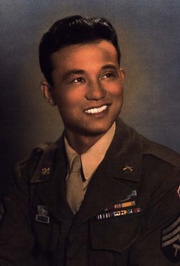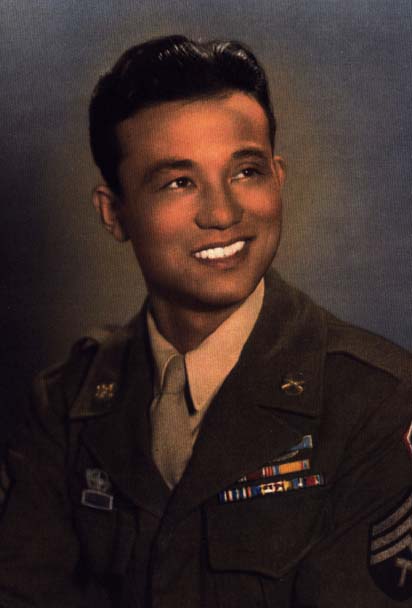
Japanese American Military Experience Database

Noboru "Nobo" Ikuta
Gender
Male
Birth date
1917-04-22
Place of birth
Hillrose CO, USA
Inducted
1941-07-14, West Los Angeles CA
Enlistment type
Draftee
Service branch
Army
Service type
War
Unit type
Combat
Units served
442nd Regimental Combat Team, Company I.
Attachment to Air Force, Medical Detachment, St. Louis, MO and Ft. Leavenworth, KS
Military specialty
Medical, Infantry, Regimental Supplies
Stationed
USA - Camp Grant, IL, Jefferson Barracks, MO, Ft. Leavenworth, KS, Camp Shelby, MS.
Other Countries: Italy; France
Separated
Ft. Leavenworth KS
Unit responsibility
Fighting the enemy - the Germans and Italians
Personal responsibility
A supply sergeant for medical detachment while serving on the stateside. While overseas, I acquired rations for the 442nd RCT.
Major battles (if served in a war zone)
Naples-Foggia Campaign
Roma-Arno Campaign
Southern France Campaign
Northern France Campaign
Rhineland Campaign
Central Europe Campaign
Po Valley Campaign.
Awards, medals, citations (individual or unit)
Awards for the 442nd RCT:
7 Presidential Unit Citation
1 congressional Medal of Honor
52 Distinguished Service Crosses
1 Distinguished Service Medal
560 Silver Stars w/ 28 Oak Leaf Cluster in lieu of second Silver Star Award
22 Legion of Merit
4,000 Bronze Stars
1200 Oak Leaf Clusters; representing second Bronze Star, 15 Soldier's medals; 12 French Croix De Guerre w/ 2 Palms representing second awards; 2 Italian Crosses for Military Merit; 2 Italian Medals for Military Valor
Living conditions
I was attached to service company from I company to acquire 442nd regiment rations. I was no longer a frontline soldier. I was able to sleep in buildings or in tents. I was able to take baths most places. Our meals were called B-rations. This was hot foods, foot soldiers ate K or C rations. We acquired the ration from division ration dumps. K rations were very bad, some foods were moldy. When we complained, they said they issued old rations first.
There was no entertainment.
Most vivid memory of military experience
Our 442nd regiment was advancing to front-line, our trucks of convoy going through area where many of the other U.S. G.I.s were. One of the G.I.s said to his comrade 'Look who we have to put up with.' Overhearing the remark, one of our crew members got up and cocked the 50 caliber machine gun, mounted on top of the cab and said out loud ' What did you say?' This G.I.'s face changed color and he ran away. I wonder what this G.I. thought about our unit? After the war ended, the 442nd RCT became the most decorated regiment of the U.S. Army.
Missed most whilst in the military
I missed my family and friends and home cooking, especially Japanese foods.
Most important thing, personally, to come from military experience?
Before the war, while I was in basic training at Camp Grant, Illinois, four of us, two Caucasians and two Japanese-Americans got a pass to Chicago. We needed a hotel room. The Caucasian GI took us to the hotel where he always stayed when he was a civilian working for his company. When we went to the hotel, we were refused a room because we were G.I.s in uniform. Before WW II, G.I.s in uniform were not acceptable. Japanese American soldiers always had to go to the poor dangerous districts for hotel rooms. Since Pearl Harbor, Chicago changed, since their sons and daughters were now in uniform. Many of my Japanese friends went to Chicago to work during and after the war and the Chicago people were very nice to the soldiers and civilians.
Additional information
I was drafted into the U.S. Army July 1941 and finished basic training in the medical corp at Camp Grant, Illinois. I was then sent to Jefferson Barracks near St. Louis, MO. That same year Japan bombed Pearl Harbor on December 7, 1941. That day, our first sergeant of the medical detachment marched us, the Japanese-American G.I.s, to the Army guard house on the post. We were placed in a small enclosure of a large guard house away from other prisoners. There were 13 of us from the U.S. Air Corp Medical Detachment. It was referred to as
'protective custody'. Our guard marched us to the mess hall early so that we would not be seen by the other G.I.s. When we returned from the mess hall, the guard called out to the corporal of the guard 'I have 13 Jap prisoners.' We complained that this was not correct for we were US soldiers and yet we were treated like prisoners. Our feeling were hurt and we could not forget this treatment. After the war I came back to Los Angeles and worked as a landscape gardener. I had a contract job near Sunset and Doheny Blvd. Next door was a restaurant where a person delivered ice for Union Ice Company. He would throw ice from his truck at me. It made me so mad that I wanted to use a spade fork on him, but since my experience at Jefferson Barracks, I could not go through the experience of going to jail again for this could be pretty tough because people didn't back us up on the West coast. After this incident, the Korean War broke out and this person was of draft age. Did he go to war? Was he killed?
Residence: West Los Angeles, CA.


